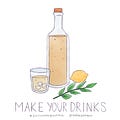29. Make Your Own Drinks
Avoid carbon emissions and pollution for this week's #52climatesolutions and make your own drinks! We share some of our favourite simple recipes and solutions.
The global beverage industry has a lot to answer for when it comes to waste and harmful impacts to the environment, given huge quantities of littered bottles (c. 4% of all drink containers are littered), production of millions of tonnes of fossil-fuel based plastics and impacts of industrialised agriculture.
Considering environmental impacts of the beverage industry, some companies have made commitments to improving their processes – to reduce energy use, switch to ‘sustainable’ packaging and reduce water and other waste. Unfortunately, such commitments are yet to be broadly implemented (and might be viewed as greenwashed marketing). Every servo, airport, and supermarket still carries walls of single-use plastic and glass containers filled with non-essential drinks. The single-use drinks juggernaut ploughs on.
Shifts to ‘sustainable’ packaging or to reuseable-packaging business models are still rarely seen. Where there are shifts, they can be ineffective, such as PepsiCo’s move to reduce plastic packaging and increase aluminium packaging (canned water, anyone?). Aluminium is one of the most energy-demanding materials to manufacture (and produces lots of waste in the process). They (and we) need to do better.
There are some encouraging commitments, such as by Carlsberg, who aim for a zero-carbon footprint by 2030. But it may be naïve to think we can wait for corporate innovation to adequately tackle climate change. Some smaller drink producers are implementing models of packaging and production that put environmental considerations to the front, offering returnable (and reusable) bottle schemes.
For this weeks’ #52climatesolutions, we want you to make your own drinks. See if you can go a week without buying juices, cordials, alcohols, soft drinks, or bottled water. For a sweet drink, try your hand at making some cordial – we have recipes for elderflower cordial and lemon cordial in our book. Consider making your own ginger beer, fruit wine or fizz for the festive season. Making drinks from local, seasonal ingredients, can strengthen the connection to your local ecosystem, whilst casting lower ecological footprint, and tasting delicious!
Our favourite recipes
When we first went waste-free, our go-to drink was water. Sometimes with a slice of lemon or a couple of mint leaves in it. Before that, we usually had a bottle of juice or cordial in the fridge. We hadn’t yet learned to make flavoured drinks for special occasions, or just because. We’re still experimenting and learning, especially when we have time and fruit/herbs etc. at hand. Here are a couple of our favourite recipes:
Keep reading with a 7-day free trial
Subscribe to The Spiral Garden to keep reading this post and get 7 days of free access to the full post archives.



